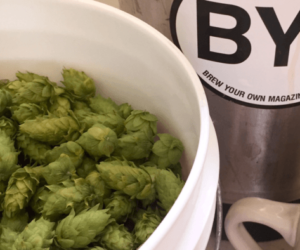Choosing A Brew School: Tips from the Pros
Brewer: Steve Parkes, American Brewers Guild in Middlebury, VT
A brewing education is a must these days. We’re past the time when an enthusiastic amateur can carry a brand into the marketplace. In the early days of craft brewing all of the pioneers were self-taught and we forget that many more failed than succeeded. There is too much money and too many people’s livelihoods at stake to take a chance on untrained employees, particularly now when there are so many potential hires with training out there.
Before choosing a school, decide what your goals are. If the goal is to quickly get hired by a craft brewery then look at the school’s placement record, and whether or not it offers an education geared toward making the student an immediate asset to the hiring brewery.
Also, make sure you have any prerequisites in place before attending any school. Math, and a “hard” science such as chemistry, biology, physics or engineering are commonly required. We’ve found at the American Brewers Guild (ABG) that without some prior education in those topics that the course work is just too difficult. Otherwise we’re not giving the student the best chance to master the material.
Be aware of the challenges. In our case it’s the workload. The ABG requires 10-12 hrs a week of lecture time, plus time spent reading and taking quizzes, etc. People are drawn to the distance learning course because it can be done part time, but it is still a big time commitment.
Brewer: Keith Lemcke, Siebel Institute of Technology in Chicago, IL
Brewing schools by nature teach the same sciences and technologies, but the courses of each of the schools are structured to emphasize different areas or to address the learner’s needs and/or existing level of knowledge. Breweries are hazardous, complex operations, and if a brewer can rely on a well-trained staff member to take on tasks with minimal supervision, they gain substantial freedom to attend to other tasks. As well, brewers who have gone through training are aware of the realities involved in professional craft brewing: heavy lifting, hot and wet working conditions, moderate pay and long hours. Many breweries have been let down by untrained staff who last in the job only a few weeks before quitting because the job did not offer the “creativity and artistry” that they were expecting, but instead found the job consisted of 80% cleaning and lifting while trying to make a small core of recipes exactly the same way each time. Breweries aren’t generally looking for new hires that have brewed 150 different recipes, but rather they are looking for staff who know the tough realities behind working as a craft brewer and appreciate all that commercial brewing offers to compensate for those tough realities.
Becoming a professional brewer requires a lifelong commitment to learning, so brewing courses offer the first steps towards building a foundation of understanding of the brewing sciences on which the brewer can base their subsequent studies.
Brewer: Michael J. Lewis, Professor Emeritus of Brewing Science at the University of California, Davis, as well as the academic director and lead instructor of UC-Davis Extension’s Professional Brewing Programs
I believe that a brewing student should choose, if possible, a residential program because the onsite interaction with other students, instructional faculty and guest lecturers in a collegial setting is hugely important for a thorough understanding. It’s also important to set aside a special time and place for learning the brewing profession without the pressure of daily work. The reputation of the school a brewer attends lasts for a lifetime, so choose the best.
Before attending our classes, we expect our students to be familiar with scientific principles of biology and physics to support our program in brewing science and brewery engineering. This is partly dictated by the advice of the Institute of Brewing and Distilling (London) whose diploma examinations our students take. We prefer a first degree (bachelors) in a science or engineering subject, but aside from that we require college-level courses in at least two of the following subjects for admission: biology, chemistry, physics or engineering.
Something that potential students might not expect is the scientific rigor of instruction, as well as the speed and depth at which subjects are covered. Also, the expectations of performance, demand for excellence and the complexity of brewing blows some students away, especially in the initial phases of instruction. Many students assume their homebrewing or practical experiences make them experts already, and initially are not well-prepared for the expectations of brewing at the professional level.
If you want to study professional brewing, I suggest that you first find someplace to work in a brewery, of whatever size and complexity, that actually makes and sells beer to the public. Make sure you really like the nature of the work, which is often physically demanding, not always pleasant and never easy. Also, make sure you can afford the brewing school experience so that money worries do not distract you from the genuinely hard work of learning the facts and practices of the brewing profession.



